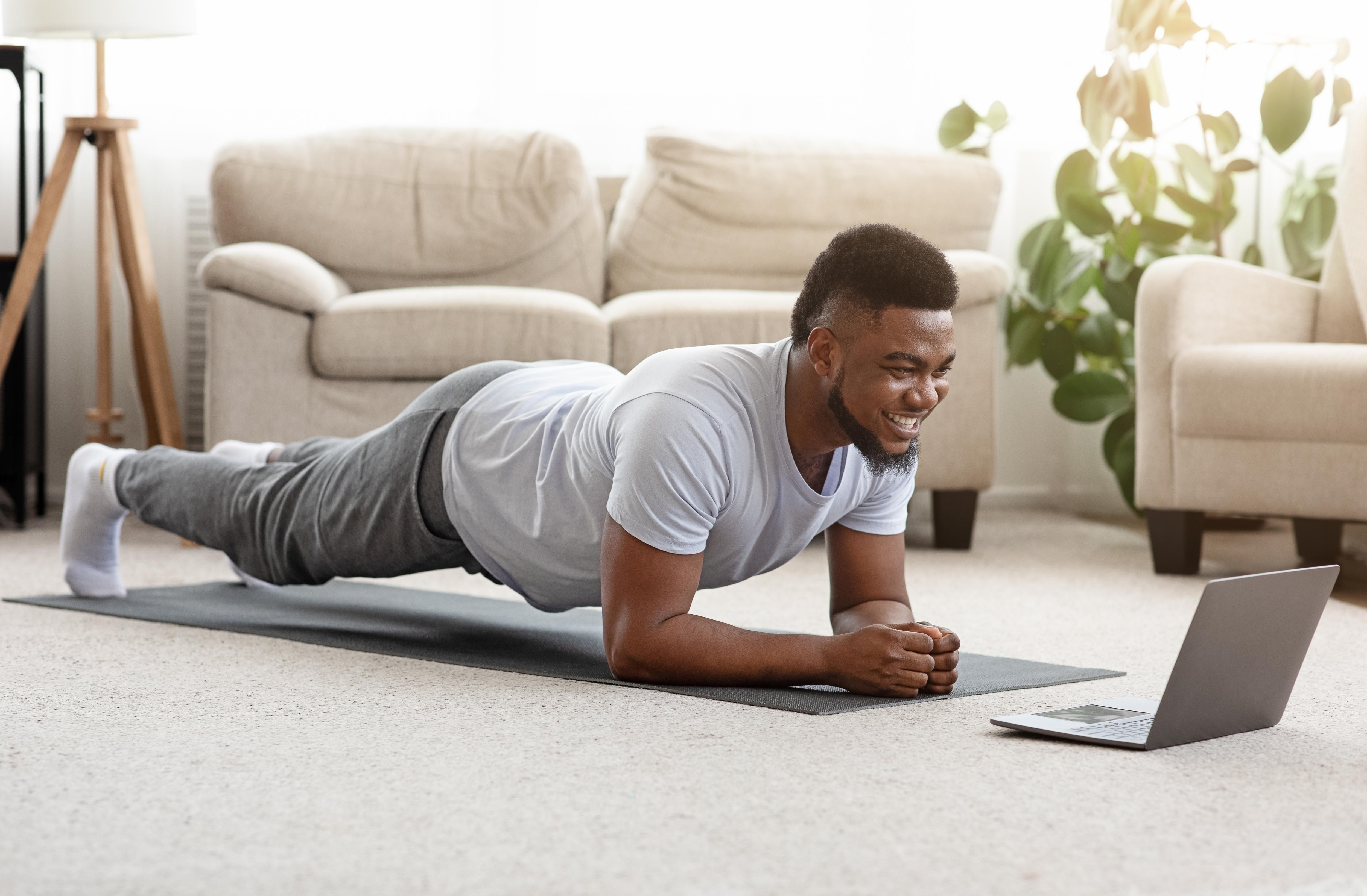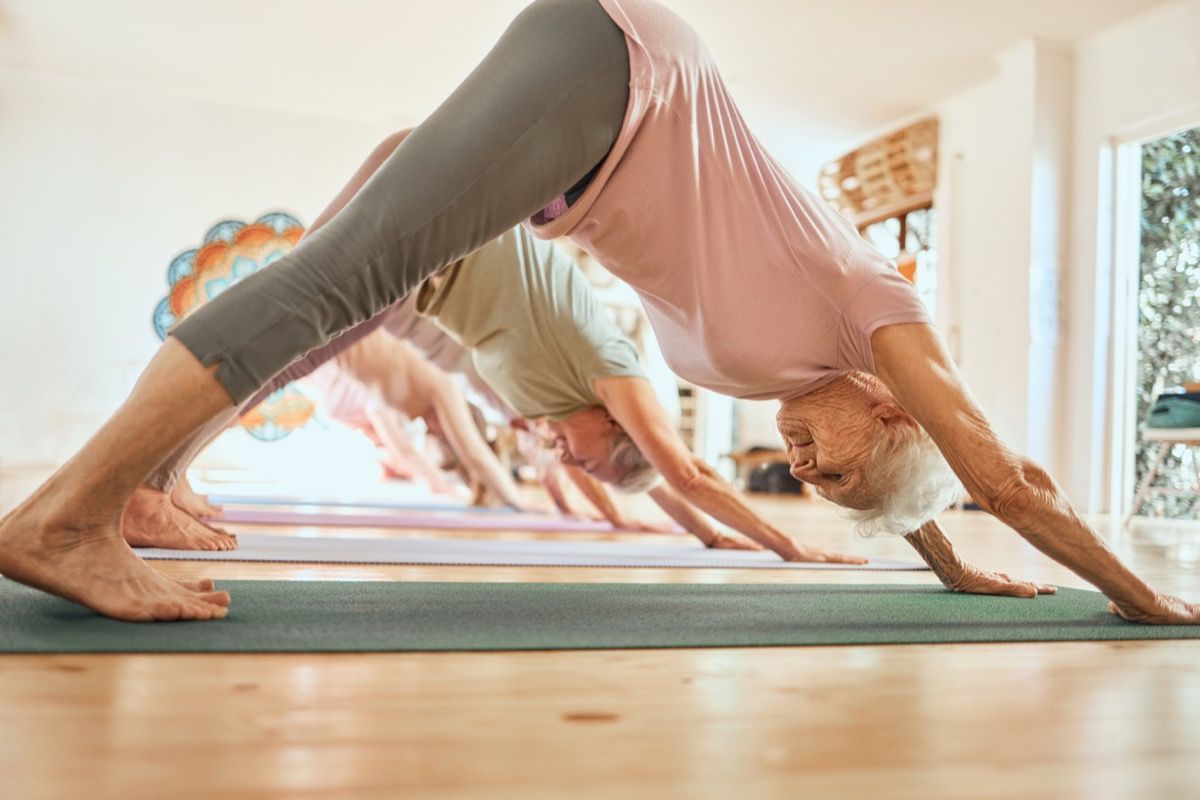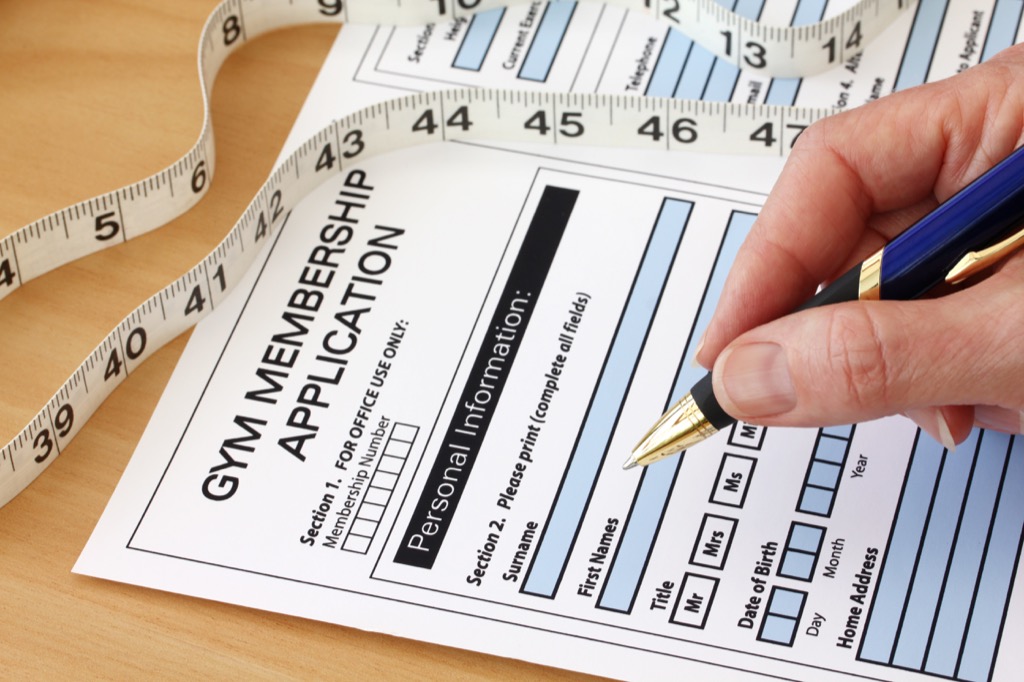9 Ways to Save Money on Fitness Expenses, Finance Pros Say
There are ways to keep both yourself and your bank account healthy.

Establishing a fitness regimen and sticking to it is one of the most important parts of staying healthy. But even if you're committed to working out, there's no denying that even the most basic routines can be a heavy burden on your budget. Modest memberships and simple home gyms can get costly more quickly than you might realize, and that's to say nothing of the more luxurious options. Fortunately, you can exercise without breaking the bank in the process, as long as you have the right approach. Read on to discover nine ways to save money on fitness, according to financial experts.
RELATED: 14 Practical Ways to Save Money Each Month.
1
Look for free videos online.

There's no denying that online content and streaming services have changed the way we access our favorite movies and shows. Thankfully, the same applies to exercise content, making it easier than ever to avoid having to join a costly gym.
"Working out at home can be very low-cost," says Trae Bodge, smart shopping expert at TrueTrae.com. "There are thousands of free videos on YouTube that require no equipment or minimal equipment, and you can level up by adding inexpensive fitness bands or weight-bearing equipment, like weights or kettlebells. Some of my favorites are BodyFit by Amy, Fit with Mik, Juice & Toya, and MadFit."
2
Check your employment benefits.

Your job likely comes with plenty of benefits on top of your salary, including health insurance and a 401K match plan. But it might also extend to other perks that could seriously help you save on fitness.
"Some companies are starting to include gym memberships and nutrition plans as part of their employee benefits," says Scott Lieberman, founder of Touchdown Money. "If yours is on that list, you can enjoy a quality gym for no cost or very few expenses."
RELATED: 9 Ways to Save Money on Household Essentials, According to Finance Experts.
3
Test out classes.

Setting up a new fitness routine might feel daunting at first, but it also offers a rare opportunity to shop around to find what you like. Fortunately, this is often less expensive than it sounds.
"Many fitness classes work like Baskin-Robbins: They give you one free class before you have to buy," says Lieberman. "If you go to 10 different classes, there's a chance you'll find one you'll want to do while getting nine free workouts on the others."
He adds that apps like ClassPass are also a fantastic option for those who want to try out many different classes without having to commit to one.
"You can also buy a package that lets you go to multiple gyms or studios to really get your money's worth," he suggests.
4
Use smart devices as your trainer.

Just like smartphones, your smartwatch has plenty of capabilities that can come in handy for monitoring your health. However, experts say the device can also be a great way to get into a workout routine for less than a traditional gym membership or trainer's fee.
"If you own a fitness watch, consider an app-based workout program, like Fitbit Premium or Apple Fitness+," Bodge advises. "These apps pair with your device and offer guidance and workouts. The best part is that they typically only cost around $80 per year."
RELATED: 10 Ways to Save Money on Childcare, According to Financial Experts.
5
Start out with a simple walking or running routine.

It can be easy to assume the only way to a solid workout routine involves joining a pricey gym or investing in home equipment. But if you're just getting started, one of the best ways to gauge how much you can commit is by sticking to a completely free form of exercise.
"Try using your feet before doing anything else," suggests Tanya Peterson, vice president at digital personal finance company Achieve.
You can make it local, convenient, and effective by starting with walking or running in your area.
"It might be right out your door through your neighborhood or at a close park or trail," she notes. "You may be surprised at how effective this can be when done consistently—all for only the cost of a good pair of shoes."
6
Time your memberships right.

Just like shopping for anything else, the cost of a gym membership or exercise equipment can vary wildly depending on when you purchase it. That's why experts say waiting for a sale is often the easiest way to spend less—especially at certain times of the year.
"If you can wait, January is often a good time to save on fitness-related expenses," Bodge tells Best Life. "Those who take a 'new year, new you' approach will find discounts on gym memberships, home fitness equipment, and fitness apparel."
7
Only buy what you know you'll use.

Sometimes, our newfound fitness ambitions can surpass what we're actually capable of. Instead of going too big off the bat, it might be best to slowly test your new routine before investing heavily.
"Even if a facility is offering a fantastic deal on personal training: If you will not use the sessions—or cannot fit them into your schedule—they are already too expensive," Peterson cautions. "Similarly, if you see a bargain on a treadmill for your house, but you know you hate working out indoors, you must pass it up."
If you want the benefits of working out at a gym but need some flexibility, she suggests considering drop-in fees or "punch passes" for a designated number of visits to a local recreation center before signing up for a flashy membership you'll barely use.
RELATED: 11 Easy Ways to Save Money on Groceries, Experts Say.
8
Try negotiating your rate.

It's no secret that gyms and studios will often bend over backward to try to get new members to join. According to money-saving expert Andrea Woroch, this is something you can often easily use to your advantage.
"Don't settle on the first price you're offered," she says.
This includes asking about discounts when you pay upfront for a few months or a year, or sign a contract for a year or more.
ANd don't get discouraged if you can't get an outright discount.
"If the sales rep can't budge on the price of the monthly membership, perhaps they can waive any registration fees or offer added value through free childcare, free guest passes, or free personal training sessions," she suggests.
Just make sure you read the fine print before you sign.
"Is there a minimum term? Will the fee change with time? Are you allowed to work out only on certain days or at certain hours? Many states have laws that allow people who purchase gym memberships a few days to back out of the deal if they change their minds," says Peterson.
9
Split the cost.

Besides helping you stay accountable, getting friends and family to work out with you can sometimes help you save money.
"If you're looking for personalized training, but don't want to pay the high fees for a one-on-one session, find a friend or two who have the same fitness goals to split the cost," Woroch recommends. "Most personal trainers don't mind, but make sure to ask first. Otherwise, opt for a small group training class instead which allows you to get some personalized tips without the high cost."





















